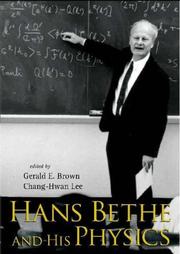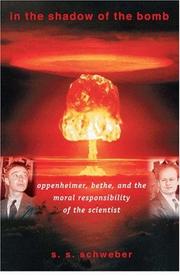| Listing 1 - 4 of 4 |
Sort by
|

ISBN: 1281378860 9786611378868 9812774505 9789812774507 9789812566096 9812566090 9789812566102 9812566104 9781281378866 9812566090 9812566104 6611378863 Year: 2006 Publisher: [Hackensack] New Jersey World Scientific
Abstract | Keywords | Export | Availability | Bookmark
 Loading...
Loading...Choose an application
- Reference Manager
- EndNote
- RefWorks (Direct export to RefWorks)
When Hans Bethe, at the age of 97, asked his long-term collaborator, Gerry Brown, to explain his scientific work to the world, the latter knew that this was a steep task. As the late John Bahcall famously remarked: "If you know his (Bethe's) work, you might be inclined to think he is really several people, all of whom are engaged in a conspiracy to sign their work with the same name". Almost eight decades of original research, hundreds of scientific papers, numerous books, countless reports spanning the key areas of 20th century physics are the impressive record of Hans Bethe's academic work.
Quantum electrodynamics. --- Astrophysics. --- Astronomical physics --- Astronomy --- Cosmic physics --- Physics --- Electrodynamics, Quantum --- QED (Physics) --- Quantum field theory --- Schwinger action principle --- Bethe, Hans A. --- Bethe, H. A. --- Bete, G., --- Bethe, Hans Albrecht,

ISBN: 0691127859 1306046173 0691049890 1400849497 9781400849499 9780691127859 Year: 2000 Publisher: Princeton, New Jersey : Princeton University Press,
Abstract | Keywords | Export | Availability | Bookmark
 Loading...
Loading...Choose an application
- Reference Manager
- EndNote
- RefWorks (Direct export to RefWorks)
In the Shadow of the Bomb narrates how two charismatic, exceptionally talented physicists--J. Robert Oppenheimer and Hans A. Bethe--came to terms with the nuclear weapons they helped to create. In 1945, the United States dropped the bomb, and physicists were forced to contemplate disquieting questions about their roles and responsibilities. When the Cold War followed, they were confronted with political demands for their loyalty and McCarthyism's threats to academic freedom. By examining how Oppenheimer and Bethe--two men with similar backgrounds but divergent aspirations and characters--struggled with these moral dilemmas, one of our foremost historians of physics tells the story of modern physics, the development of atomic weapons, and the Cold War. Oppenheimer and Bethe led parallel lives. Both received liberal educations that emphasized moral as well as intellectual growth. Both were outstanding theoreticians who worked on the atom bomb at Los Alamos. Both advised the government on nuclear issues, and both resisted the development of the hydrogen bomb. Both were, in their youth, sympathetic to liberal causes, and both were later called to defend the United States against Soviet communism and colleagues against anti-Communist crusaders. Finally, both prized scientific community as a salve to the apparent failure of Enlightenment values. Yet, their responses to the use of the atom bomb, the testing of the hydrogen bomb, and the treachery of domestic politics differed markedly. Bethe, who drew confidence from scientific achievement and integration into the physics community, preserved a deep integrity. By accepting a modest role, he continued to influence policy and contributed to the nuclear test ban treaty of 1963. In contrast, Oppenheimer first embodied a new scientific persona--the scientist who creates knowledge and technology affecting all humanity and boldly addresses their impact--and then could not carry its burden. His desire to retain insider status, combined with his isolation from creative work and collegial scientific community, led him to compromise principles and, ironically, to lose prestige and fall victim to other insiders. Schweber draws on his vast knowledge of science and its history--in addition to his unique access to the personalities involved--to tell a tale of two men that will enthrall readers interested in science, history, and the lives and minds of great thinkers.
Atomic bomb --- Nuclear physicists --- Oppenheimer, J. Robert, --- Bethe, Hans A. --- A-bomb --- Atom bomb --- Bethe, H. A. --- Bete, G., --- Ou-pên-hai-mo, --- Oppenheimer, Robert, --- Oppenheimer, Julius Robert, --- Physicists --- Bombs --- Nuclear weapons --- Moral and ethical aspects --- Oppenheimer, J. Robert --- Bethe, Hans Albrecht --- United States --- Nuclear physics --- Biography
Book
ISBN: 0674065530 9780674065536 9780674065871 0674065875 0674070127 9780674070127 Year: 2012 Publisher: Cambridge, MA
Abstract | Keywords | Export | Availability | Bookmark
 Loading...
Loading...Choose an application
- Reference Manager
- EndNote
- RefWorks (Direct export to RefWorks)
On the fiftieth anniversary of Hiroshima, Nobel-winning physicist Hans Bethe called on his fellow scientists to stop working on weapons of mass destruction. What drove Bethe, the head of Theoretical Physics at Los Alamos during the Manhattan Project, to renounce the weaponry he had once worked so tirelessly to create? That is one of the questions answered by Nuclear Forces, a riveting biography of Bethe's early life and development as both a scientist and a man of principle. As Silvan Schweber follows Bethe from his childhood in Germany, to laboratories in Italy and England, and on to Cornell University, he shows how these differing environments were reflected in the kind of physics Bethe produced. Many of the young quantum physicists in the 1930's, including Bethe, had Jewish roots, and Schweber considers how Liberal Judaism in Germany helps explain their remarkable contributions. A portrait emerges of a man whose strategy for staying on top of a deeply hierarchical field was to tackle only those problems he knew he could solve. Bethe's emotional maturation was shaped by his father and by two women of Jewish background: his overly possessive mother and his wife, who would later serve as an ethical touchstone during the turbulent years he spent designing nuclear bombs. Situating Bethe in the context of the various communities where he worked, Schweber provides a full picture of prewar developments in physics that changed the modern world, and of a scientist shaped by the unprecedented moral dilemmas those developments in turn created.
Atomic bomb --- Nuclear physicists --- Nuclear warfare --- Nuclear weapons --- BIOGRAPHY & AUTOBIOGRAPHY / Science & Technology. --- Atomic warfare --- CBR warfare --- Nuclear strategy --- Nuclear war --- Thermonuclear warfare --- War --- Nuclear crisis control --- Atomic weapons --- Fusion weapons --- Thermonuclear weapons --- Weapons of mass destruction --- No first use (Nuclear strategy) --- Nuclear arms control --- Nuclear disarmament --- A-bomb --- Atom bomb --- Bombs --- Physicists --- Moral and ethical aspects --- Bethe, Hans A. --- Political and social views. --- Manhattan Project (U.S.) --- Bethe, H. A. --- Bete, G., --- United States. --- Bethe, Hans Albrecht,
Book
ISBN: 0444409939 9780444409935 Year: 1972 Publisher: Amsterdam ; London ; New York : Elsevier Publishing Company,
Abstract | Keywords | Export | Availability | Bookmark
 Loading...
Loading...Choose an application
- Reference Manager
- EndNote
- RefWorks (Direct export to RefWorks)
Prix Nobel de physique. --- Physique --- Nobel Prizes. --- Physics --- Recherche. --- Awards. --- Wigner, Eugene Paul, --- Mayer, Maria Goeppert, --- Jensen, J. Hans D. --- Townes, Charles H. --- Basov, N. G. --- Prokhorov, A. M. --- Schwinger, Julian, --- Feynman, Richard P. --- Kastler, Alfred. --- Bethe, Hans A. --- Alvarez, Luis W., --- Gell-Mann, Murray. --- Alfvén, Hannes, --- Néel, Louis, --- Jensen, Johannes Hans Daniel, --- Townes, Charles Hard, --- Bethe, Hans Albrecht, --- Basov, Nikolaĭ Gennadievich, --- Tomonaga, Shin'ichirō, --- Prohorov, Aleksandr Mihajlovič, --- Tomonaga, Shin'ichirō, --- Feynman, Richard Phillips, --- Kastler, Alfred, --- Alvarez, Luis Walter, --- Gell-Mann, Murray, --- Alfvén, Hannes, --- Néel, Louis,
| Listing 1 - 4 of 4 |
Sort by
|

 Search
Search Feedback
Feedback About UniCat
About UniCat  Help
Help News
News